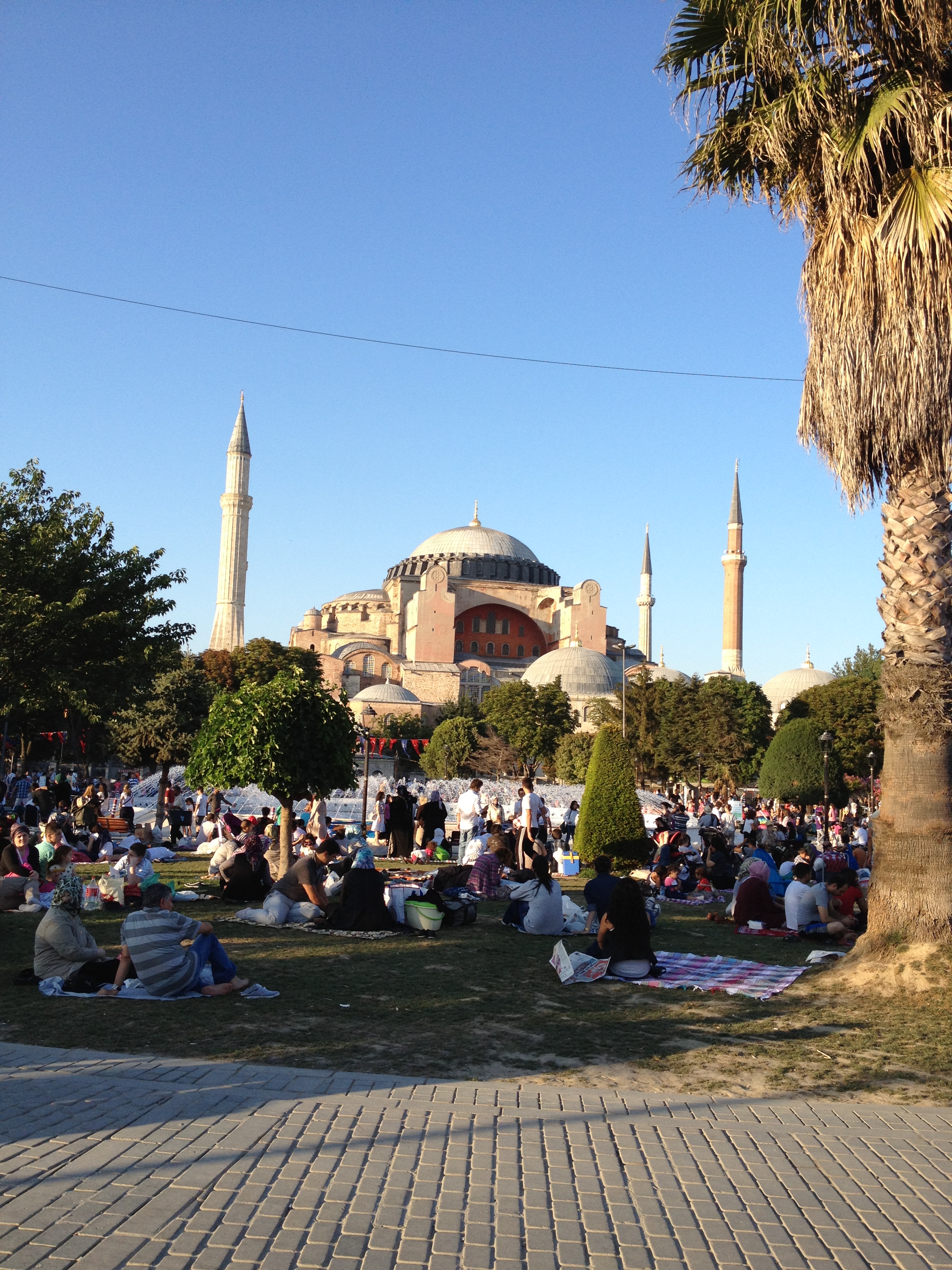Hello all, and Ramadan kareem to those celebrating it.
I hope you’ve been enjoying the Ramadan post series so far! We’ve got lots more posts on the way for you. I’m linking the stories that we’ve posted so far at the bottom of this post, and will be adding to those links as the month goes on, so that the posts can easily be found in one place.
I wanted to take a minute to back up and give a bit of basic information on what Ramadan is, and on some of the terms used in our Ramadan posts, for those less familiar with this month and what it entails.

People waiting to break their fasts in front of Istanbul’s Hagia Sophia, on the third day of Ramadan.
First, for those fuzzy on Ramadan itself, it’s the ninth month in the Islamic calendar, and a month when Muslims who are able are expected to fast from dawn (fajr) to sunset (maghrib) each day. Exceptions are made for those with health conditions that would make fasting harmful to them, or people who are sick, pregnant, breastfeeding, traveling, or menstruating.
Because the Islamic calendar is a lunar calendar, the year (twelve months, or twelve moon cycles) is slightly shorter than the solar year, which means that Ramadan comes about eleven days earlier each year, with relation to the solar calendar, than the year before. Last year, Ramadan started at the beginning of August; this year it was July 20, give or take a day or two because of disagreements on how exactly the beginning of the month should be determined.
Here’s some other terminology you might encounter in our Ramadan posts. Because the words come from Arabic originally, they might be transliterated slightly differently by different writers; I’ve left the different spellings as they are, since they often reflect the diversity of regional pronunciations as well. If you come across a word in one of the posts that isn’t translated here, please leave a comment and I’ll add it to this list!
Glossary of Ramadan terms
Asr – the third prayer of the day, in the late afternoon
Dhikr/zikr – translated as both “remembrance” and “mentioning,” usually a way of invoking God by repeating God’s name or certain phrases; the term also refers to gatherings in which these phrases are repeated collectively in a group
Dhuhr/zuhr – the second prayer of the day, in the early afternoon
Eid (Eid-al-fitr) – the holiday marking the end of Ramadan
Fajr – the first prayer of the day, beginning at dawn, when the first light starts appearing in the sky; this is also when the fasting begins
Iftar – the breaking of the fast (this word can refer to the time when the fast can be broken, or to the meal eaten to break the fast)
Isha – the fifth and last prayer of the day, at night
Maghrib – the fourth prayer of the day, at sunset; this is when the fast can be broken
Masjid – mosque
Suhoor – the meal eaten right before fajr (in other words, the last meal before the fasting begins)
Tarawih/Taraweeh – extra night prayers after isha, prayed only during Ramadan
Our Ramadan posts so far
Ramadan (Food) and the Working Girl by Nicole
Iftar in a Nigerian Home by Anike
Ramadan in Egypt by Eman
Mexican-Lebanese Ramadan Food by Eren
Building Ramadan Traditions, Then and Now by Anneke
Ramadan: The Mother and Activist by Safiyyah
Fajr Ruminations on Ramadan in the Middle of Nowhere by Sana
From Moping to Musing: My Ramadan Roller Coaster by Diana
Of Haircuts, Pakoras and Pink Lemonade by Merium
Ramadan in Singapore by guest contributor Sya
Ramadan in Egypt: A Personal Perspective by Eman
The First Ramadan by Eren
Smultron for Suhur: Nomadic Memories of Ramadan Abroad by Tasnim
Ramadan Dawah by Nicole
Majestic Mosques and Simple Kindness: A Turkish Start to Ramadan by Krista
Ramadan in a Time of Movement by Diana
Ramadan Thoughts over Tamarind Chutney by Azra
Good Memories of Hijab and Ramadan by Samya
Ramadan Confessions by Merium



